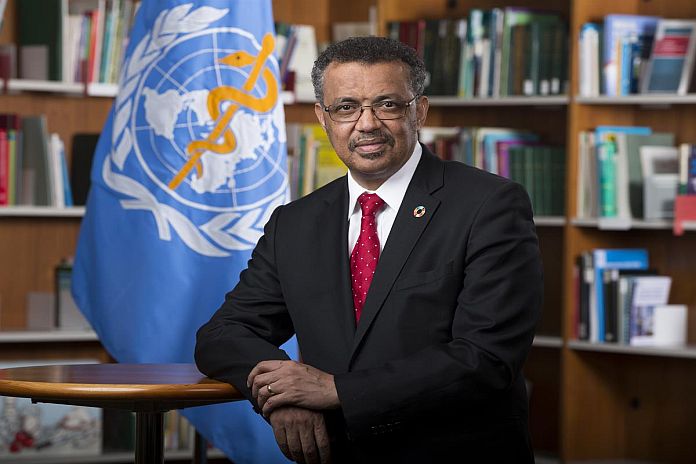GENEVA, Switzerland — The resumed 73rd World Health Assembly (WHA73) opened to the tune of the classic hit song “We are Family” by Sister Sledge, the Kingdom of Tonga’ Nurses’ Choir and a powerful speech by the WHO Director-General calling for predictable and sustainable WHO funding, the launch of a Universal Health and Preparedness Review and the need to “reimagine” global leadership and “forge a new era of cooperation” reflecting the lessons of the COVID-19 pandemic.
Dr Tedros called on Member States to “address the shocking and expanding imbalance between assessed contributions and voluntary, largely earmarked funds,” observing that WHO’s annual budget is equivalent to what the world spends on tobacco products in a single day.
He warned that “a vaccine cannot address the global under-investment in essential public health functions and resilient health systems, nor the urgent need for a “One Health” approach that encompasses the health of humans, animals and the planet we share. There is no vaccine for poverty, hunger, climate change or inequality.”
He called for “leadership built on mutual trust and mutual accountability – to end the pandemic and address the fundamental inequalities that lie at the root of so many of the world’s problems.”
“It’s time for the world to heal – from the ravages of this pandemic, and the geopolitical divisions that only drive us further into the chasm of an unhealthier, un-safer and unfairer future” he said. “Today and every day, we must choose health. We’re one big family.”
Dr Michael Ryan, executive director, WHO Health Emergencies Programme (WHE), gave an epidemiological update on the COVID-19 pandemic, noting “the grim milestone” of 50 million cases globally.
The chair of the Independent Oversight and Advisory Committee for the WHO Health Emergencies Programme (IOAC), Dr Felicity Harvey, presented the IOAC report, which makes several recommendations and concludes that: “Over the last four years, the WHE programme has demonstrated its capacity to manage multiple emergencies and has helped affirm WHO’s position as a global health leader, but the COVID-19 pandemic has thrown the challenges faced by WHO in handling a global pandemic into stark relief and has placed the WHE Programme under global public scrutiny.”
The chair of the Review Committee on the functioning of the International Health Regulations (2005) during COVID-19 response, Professor Lothar H. Wieler, president of the Robert Koch Institute, Germany provided an update on the work of the Committee and its preliminary findings.
Senior advisor to the director-general, Dr Bruce Aylward, briefed Member States on the progress of the Access to COVID-19 Tools (ACT) Accelerator, noting key achievements with regard to rapid tests, life-saving treatments, and the COVAX facility with its equitable allocation framework.
He remarked that access to these critical tools differs widely across countries and could worsen without urgent action to close the ACT-Accelerator’s US$4.5 billion financing gap.
The WHO Director-General’s Health Leaders Award for outstanding leadership in global health was awarded to Her Royal Highness Princess Muna Al-Hussein of Jordan, the Honourable Minister for Health of the Kingdom of Tonga, Dr Amelia Afuhaamango Tuipulotu, and the Kingdom of Tonga’s Nurses’ Choir.
The WHA73 considered a proposal for a supplementary agenda item entitled “Inviting Taiwan to participate in the World Health Assembly as an observer”.
The proposal was considered in accordance with an agreed process for a structured debate, known as a “two plus two” arrangement. Following this process, the WHA73 decided not to include this item on its agenda.
This is the 15th time since 1997 that such a proposal has been submitted.
In line with an analogous decision of the UN General Assembly, the World Health Assembly though resolution WHA 25.1, of 1972, decided “(…) to recognize the representatives of its Government as the only legitimate representatives of China to the World Health Organization (…)”. This decision still applies, 48 years later.
Although the question of Taiwanese membership in WHO and its participation in the World Health Assembly remains a question for Member States, WHO works with all health authorities who are facing the current coronavirus pandemic, including Taiwanese health experts.
Related: Combating COVID-19: Taiwan Can Help, Taiwan is Helping





